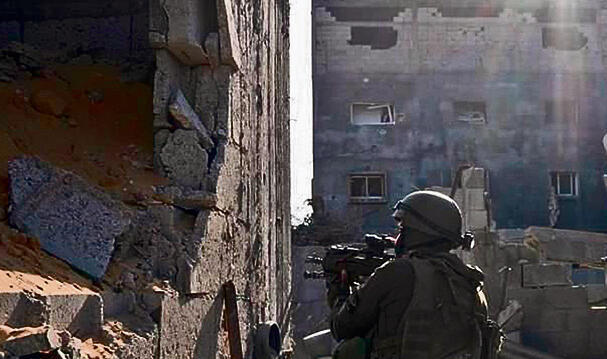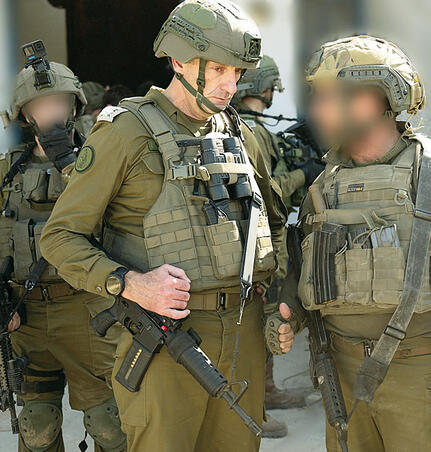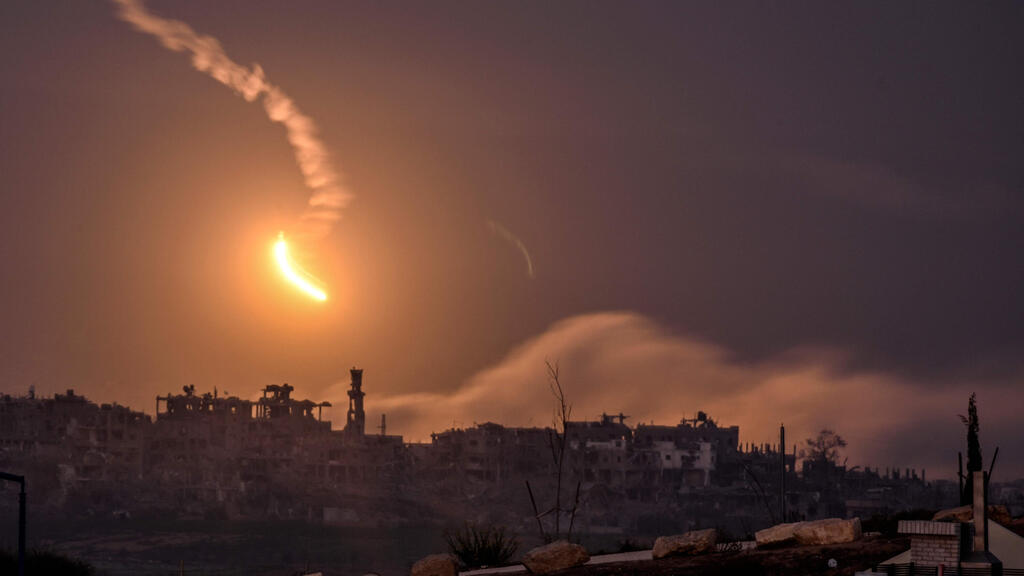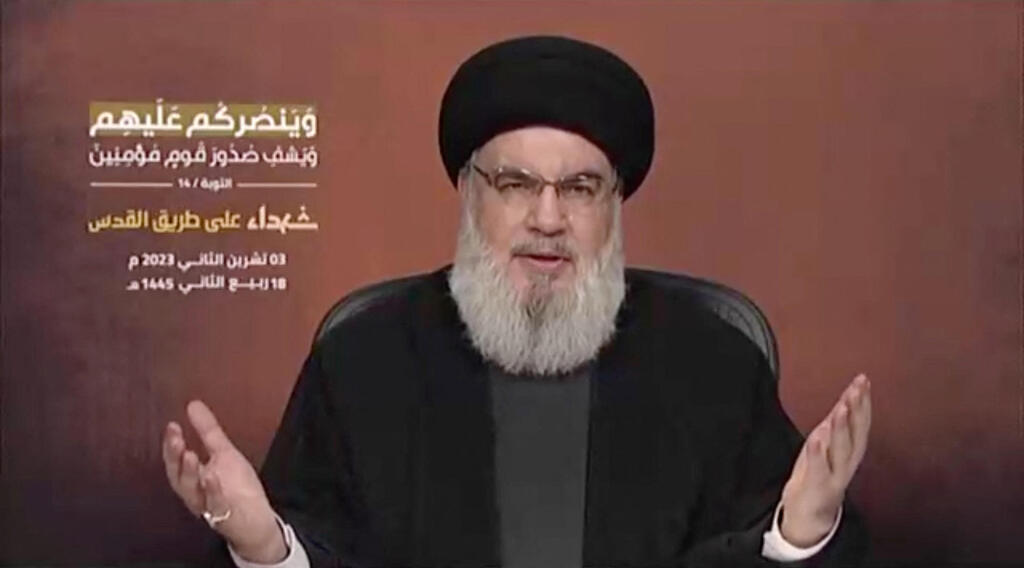A month may not be much time in the life of a nation, but the four weeks that have passed since October 7 felt like an eternity for everyone in Israel. We find it difficult to remember who we were until that Saturday morning, and we find it challenging to imagine who we’ll become when all is said and done, whenever that will be. Therefore, at this point, it's crucial to understand how the military leadership in the field views the situation. In talks they ask to deliver a single message: this is only the beginning.
More stories:
According to their method, the IDF is not "requesting" time; it must have it. It requires it because this is not just another round of fighting, but a war aimed at removing a threat that has been building for over three decades and is much more potent than Israel ever wanted to acknowledge.
As long as this threat is able to field military and political power, The state can’t coexist alongside it. This illusion has been uncovered in the final quiet hours of the kibbutzim and communities close to the Gaza border, which have since known no laughter and become filled with bitterness, failure and death.
The most senior military officials assert that halting the war before a concrete removal of the threat will lead to a much more challenging confrontation in a short while. Remember, they say, that every round was supposed to push the next one even further away. Benyamin (Fuad) Ben-Eliezer commented on this doctrine in his time: "Let this concept die.” Without a clear victory, not even farm animals would return to communities close to the Gaza border.
Surprisingly, the military claims that the Americans share the same stance. Despite reports of the White House's desire to increase humanitarian aid in Gaza and impose some conditions, a senior security official asserted: "The Americans are explicitly telling us that they expect Hamas not to exist after the war. Therefore, we can’t both accept humanitarian cease-fires that will undermine the offensive and jeopardize our forces."
Agreement within the army about the acute additional need for time doesn’t reflect unanimity in the command. There are two opposing approaches: on the one hand, a faction that presses for a forward push according to the plans outlined in the war rooms. On the other hand, commanders in the field argue that a different approach is needed: "The ground beneath us is ready to explode," they say.
"It’s dangerous to advance without addressing the subterranean infrastructure. You told us to destroy Hamas. That's where it is, and that's where it needs to be tackled, not skipped over. If we do not do it thoroughly, it will simply reemerge, dust itself off, and continue to rule Gaza. Therefore, we must eliminate those underground, not move forward. There's no such thing as a half-war."
Meanwhile, the brigades assigned to the offensive are closely encircling Gaza City from all directions. The relative advantage of the IDF is aerial control, so that Hamas’s main attack method—emerging from underground, firing anti-tank missiles, and crawling back into tunnels—is severely losing effectiveness.
Most of the dead terrorists credit their demise to aerial hits rather than face-to-face combat. Even there, the IDF has achieved successes but also sustained casualties. On Saturday, the military released the names of four soldiers who fell into the fierce fighting, three of them from the Givati Brigade, which spearheads the offensive.
The IDF is looking for Hamas’ breaking point, which is continuing to fight and harm Israeli forces. Therefore, the troops are operating slowly and cautiously, which contradicts the public (and American) expectation to quickly end the war and return to routine for well-known reasons.
Not only is the political clock ticking, but the economic one is ticking away as well as hundreds of thousands are drafted into reserve units, and the Israeli market has been operating in a limited format for over 30 days. Additionally, the military will continue to deal with the threat of snipers firing from afar.
For now, Gaza will remain in the spotlight, even after Hezbollah Secretary-General Hassan Nasrallah's speech on Friday. Although Hezbollah terrorists made ready for the speech with attacks on military positions in Mount Dov and Kiryat Shemona, the terrorist organization also fired heavy rockets weighing hundreds of kilograms each at Israel, with significant destructive potential.
The basic equation in the conflict, however, remains constant with few expansions: the IDF is striking slightly beyond the five-kilometer line from the border and begins to neutralize Hezbollah's capabilities on the contact line. Of course, this won’t be enough to convince Israeli residents living close to the Lebanon border to return there once the war is over, but it’s certainly the direction that the IDF needs to adopt, apart from a strong defense.
It's also important to address some of the confusing reactions in Israel to Nasrallah's speech. Some analysts, officials in the Prime Minister's Office, and a spokesperson from the Public Diplomacy Directorate perceived Nasrallah's speech as a show of weakness.
Military officials, however, treat Nasrallah with the required caution. IDF Northern Command Chief, Maj. Gen. Uri Gordin instructed not to reduce readiness on the northern border. The Israel Air Force also emphasized their full readiness, and no one dares to think that Hezbollah’s head is deterred by Israel.
In fact, those who paid attention to the speech understood that Nasrallah deliberately distributed kindness to anyone he had an interest in keeping close: to the Shiite community and his patron in Iran, he cleared his hands from the October 7 attack.
For Hamas, who would’ve liked to see Nasrallah fight for their sake, he praised their terrorist and left the door open for a full combined assault on Israel. "If Nasrallah makes a mistake, he will doom Lebanon's fate," Defense Minister Yoav Gallant said last week.
Nasrallah's words align with Israel's intelligence assessment, indicating that Hamas didn’t clue Iran and Hezbollah before carrying out the massacre. This is why Israel needs to pay attention to the threat he voiced, according to which "all options are on the table, and we may turn to them."
What Israel should avoid dramatic images of the Air Force preparing for a comprehensive war that would send the entire population to live in their shelters for months, boastful and arrogant claims, as if we learned nothing from the worst month in Israel's history.






